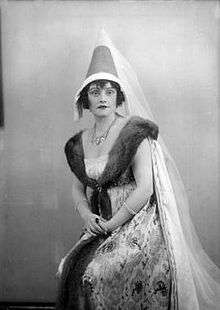Margit Angerer

Margit Angerer (born "Margit von Rupp": 6 November 1895 - 31 January 1978) was a Hungarian opera soprano.[1][2][lower-alpha 1]
Biography
Maergit von Rupp was born in Budapest. She studied at the Fodor Conservatorium and at the Budapest Music Academy[1] where she was taught by Arturo de Sanctis. She made her debut in Budapest. After her marriage to the logistics entrepreneure Gottfried Schenker-Angerer[4] in 1920 and the birth of their daughter Maria in 1922 she relocated to Vienna in 1927.[2] She had already made her Vienna debut the previous year as Donna Leonora in Verdi's La forza del destino. Her debut was the more noteworthy because she was not a product of the mainstream Vienna arts establishment.[5] In 1927 she concluded a contract with the Vienna State Opera where she sustained a successful career till 1935.[2]
Between 1926 and 1935 she appeared more than 160 times in solo roles at the Vienna Opera.[2] There were also guest appearances elsewhere, notably at the Salzburg Festival where she appeared in 1930, 1933 and 1935 as Octavian in Rosenkavalier. She regularly played Octavian in Vienna, too, and it appears to have been the role for which she was best known.[1] Other frequent stage portrayals included Elsa in Lohengrin and Dorota in Weinberger's Schwanda the Bagpiper.[1]
She made her first appearance in the title role of Gluck's Iphigénie en Aulide at Salzburg in 1930. It was also at Salzburg that in 1933 she appeared as Aithra in Egyptian Helena, a less well known product of the long professional partnership between Richard Strauss and his librettist Hugo von Hofmannsthal.[1] Nor was Argerer entirely unknown to cinema audiences: she featured as "the concert singer" in Gustav Fröhlich's "Rakoczy-Marsch" (1933).
Angerer also quickly made herself a reputation as a Lieder singer once she arrived in Vienna. In 1928 she gave the world premier of "Three sings for singer and piano Opus 22" by Korngold, accompanied at the piano by the composer himself.[6]
After 1935 she no longer appeared at the Vienna State Opera, although sources indicate that she continued to appear as a Lieder singer. There are indications that her retirement from the opera house may have resulted from her having been identified as a government opponent. Austria had become a post-democratic state, formally in 1934, and the authorities were increasingly intolerant of criticism. Sources also state that in 1938 Margit moved to London where she continued to giver recitals under the name "Margit Angerer-Schenker".[1][2] However, in November 1946 she submitted a successful application for membership of the Association of Political Prisoners, in which she stated that in October 1944, while still living in Vienna, she and her daughter had been detained by the Gestapo.[7] It does in any case appear that by 1946 she was in London. There is no record of her having still been singing in public, but early in 1949 she married Stephan Karpeles-Schenker at Westminster in England.[8]
Several gramophone recordings exist including a compilation of six songs which Margit Angerer made with Alfred Piccaver between 1928 and 1930.[9]
Notes
- ↑ Like a number of stage performers from this period, especially those that moved away from their country of birth, Margit Angerer lost a few years from her age over time. The more insistent sources nevertheless assert that 1895 is her correct birth year, and 1895 is also the birth year given on her behalf to the registrar in London, England when she died.[3]
References
- 1 2 3 4 5 6 Karl-Josef Kutsch; Leo Riemens (22 February 2012). Angerer, Margit, Sopran. Großes Sängerlexikon. Walter de Gruyter. p. 113. ISBN 978-3-598-44088-5.
- 1 2 3 4 5 "Angerer, Margit (geb. Rupp, verh. Schenker-Angerer)". Oesterreichische Musiklexikon. Österreichische Akademie der Wissenschaften, Wien. Retrieved 5 October 2018.
- ↑ "Index entry". FreeBMD. ONS. Retrieved 5 October 2018.
- ↑ Marcel Prawy, The Vienna Opera (New York 1970), pp. 120–121
- ↑ Chronik der Wiener Staatsoper 1869 bis 2009, hg. von Wiener Staatsoper, zusammengestellt von Andreas Láng und Oliver Láng (Wien 2009) ISBN 978-3-85409-538-5. Part 2: Künstlerverzeichnis.
- ↑ "Erich Wolfgang Korngold: DREI LIEDER "To my Mother" Op.22, Composed between 1928 and 1929". World Premiere:[No.1] Wien - 12/09/1928 - Margit Angerer (Sopran) - Erich Wolfgang Korngold (Piano) ... Claude Torres, Montpellier (Mes musiques régénérées). Retrieved 5 October 2018.
- ↑ "Bescheinigung datiert 30. Nov. 1946, Anhang zum Aufnahmeantrag in den Verband politischer Häftlinge vom 31. Dez. 1946,". DÖW 20100/10217. Documentation Centre of Austrian Resistance.
- ↑ "Index entry". FreeBMD. ONS. Retrieved 5 October 2018.
- ↑ Patrick O'Connor. "Alfred Piccaver The Complete Electric Recordings 1928-1930". Gramophone: The world's best classical music reviews. Mark Allen Group, London. Retrieved 6 October 2018.